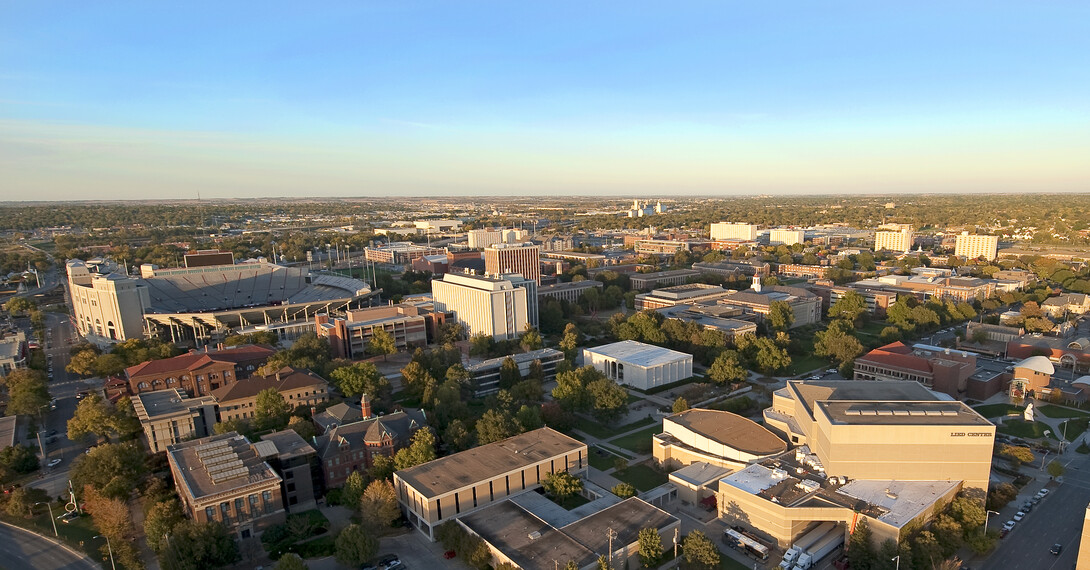
Implementation of UNL’s reaffirmation of accreditation plan began Jan. 7 with more than 65 faculty, staff and students attending a work group retreat at Nebraska Innovation Campus.
The Office of Academic Affairs is coordinating preparation for the comprehensive evaluation and site visit, which is expected during the 2016-2017 academic year.
“We began planning for this two years ago. UNL is well-positioned to take on the reaffirmation process,” said Ellen Weissinger, senior vice chancellor for academic affairs.
Laurie Bellows, associate dean of graduate studies, is UNL’s Higher Learning Commission accreditation liaison and is leading the reaffirmation process. UNL is a member of the HLC, which accredits degree-granting post-secondary education institution in the North Central region. UNL’s most recent accreditation was in 2006.
Accreditation is a process of external quality review created and used by higher education to scrutinize colleges, universities, and education programs for quality assurance and quality improvement – a “seal of approval” that assures prospective students, parents, employers and other stakeholders that UNL offers quality programs and learning experiences.
The 2016-2017 reaffirmation process is significantly different from previous accreditations. Changes include the criteria for accreditation, the type of document produced, the length of the site visit, a student survey and a quality-improvement project.
Anyone who is interested is encouraged to complete the HLC Criterion Matrix. The matrix can be accessed online and the completed matrix can be sent to Bellows at lbellows1@unl.edu, to the committee chairs or to academicaffairs@unl.edu.
The accreditation process is governed by the five criteria for accreditation. These are standards of quality by which the HLC determines whether an institution merits reaffirmation. The new criteria for accreditation includes an increased focus on the processes and systems used to ensure quality programs and services and an emphasis on using what we learn through assessment and program evaluation to improve what we do, which special attention to student learning outcomes, student achievement and transparency.
Criterion work groups are charged with the responsibility of developing an assurance argument and identifying and collecting evidentiary materials, while the federal compliance work group will evaluate the university’s compliance with federal guidelines.
On Jan. 7, committee chairs met with their groups to begin reviewing and analyzing the criteria. At the same time, the federal compliance team met to discuss compilation of a compliance report.
Chairs and members of the work groups are:
The university’s mission
Renee Batman, assistant vice chancellor for academic affairs (chair); Rick Alloway, associate professor, broadcasting; Gwen Bachman, associate professor, School of Biological Sciences; Andre Fortune, assistant to the vice chancellor of student affairs, director, Jackie Gaughan Multicultural Center and OASIS; Ray Hames, professor, anthropology; Chuck Hibberd, professor, animal science and dean, Nebraska Extension; Matt Joeckel, associate director, School of Natural Resource Sciences; Susan Levine Ourada, associate professor, Glenn Korff School of Music; Monica Norby, assistant vice chancellor for research and economic development; Jane Schneider, president, University of Nebraska Office Personnel Association and fellowship specialist, graduate studies.
Integrity: ethical and responsible conduct
Steve Goddard, professor, computer science and engineering and associate vice chancellor, Office of Research and Economic Development (chair); Erin Blankenship, professor, statistics; Layton Brooks, director of employee relations, Human Resources; Neal Bryan, associate director, Graduate Student and Postdoctoral Development, Office of Graduate Studies; Matt Hecker, dean of students; Dan Hoyt, professor, sociology and associate dean, College of Arts and Sciences; Richard Morrell, university registrar; Adam Thompson, assistant director, ethics center; Julie Torquati, professor, child, youth and family studies.
Teaching and learning: quality, resources and support
Amy Goodburn, professor, English and associate vice chancellor of academic affairs (chair); Alvin Banks, academic counselor, athletics; Marie Barber, executive director, online and distance education; Tonia Durden, assistant professor, child, youth and family studies; Valery Forbes, director, School of Biological Sciences; Jody Kellas, associate professor, communication studies; Deepak Keshwani, assistant professor, biological systems engineering; Don Lee, professor, agronomy and horticulture; Charlene Maxey-Harris, chair, university libraries; Carl Nelson, associate professor, mechanical engineering; Mark Pegg, professor, School of Natural Resource Sciences; Veronica Riepe, director, student involvement; Patty Sollars, associate professor, veterinary medicine and biomedical sciences; Marilyne Stains, assistant professor, chemistry; Heath Tuttle, director for learning and emerging technology, ITS; Bill Watts, director, University Advising and Career Services; Derek Niewohner, graduate student, ASUN representative.
Teaching and learning: evaluation and improvement
Nancy Mitchell, professor, advertising and chair of undergraduate education programs (chair); Sohrab Asgarpoor, professor, electrical engineering; Beth Doll, professor, educational psychology and associate dean, education and human sciences; Allan Donsig, associate professor, mathematics; Frauke Hachtmann, professor, advertising; Tiffany Heng-Moss, professor, entomology and associate dean, College of Agriculture Sciences and Natural Resources; Linda Major, assistant to the vice chancellor for student affairs; John Markwell, professor, biochemistry and associate dean, College of Agriculture Sciences and Natural Resources; Debbie Minter, associate professor, English and associate dean, College of Arts and Sciences; Jeff Rudy, associate professor of practice, nutrition and health sciences; Beth Theiss-Morse, professor, political science.
Resources, planning and institutional effectiveness
Bill Nunez, associate to the chancellor (chair); Bruce Currin, assistant vice chancellor for human resources; Lance Pérez, dean of graduate studies and associate vice chancellor for academic affairs; Jennifer Dam, assistant director, campus planning and space management; Kathy Farrell, professor, finance; Vicki Highstreet, associate director, Campus Recreation, UADD representative; Jennifer Lesoing-Lucs, assistant vice chancellor for academic affairs; Diana Pilson, associate professor, School of Biological Sciences and associate dean, College of Arts and Sciences; Michael Ruhrdanz, director of infrastructure and operations, IANR; Brad Sheriff, assistant vice chancellor, academic affairs; Mary Werner, associate director, Institutional Research and Planning; Ron Yoder, professor, biological systems engineering and associate vice chancellor, IANR.
Federal compliance work group
James Volkmer, assistant dean, enrollment management (chair); Steve Booton, associate registrar; Kay Dinkelman, associate director, scholarships and financial aid; Aaron Dominguez, professor, physics and astronomy and associate dean, College of Arts and Sciences; Mary LaGrange, controller, accounting; Michael Maas, compliance and accreditation manager, UNL Police; Arturo Perez, associate director, Equity, Access and Diversity Programs; Jamie Vaughn, associate athletic director, athletics.
More information on the 2016-2017 Reaffirmation of Accreditation is available here. The page will be updated regularly to keep the campus and other stakeholders informed of the HLC reaffirmation process and the purpose, goals and outcomes of the comprehensive evaluation.







